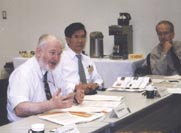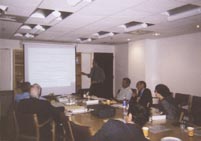  |
 |
 |
A
new team takes over at the Advanced Technology Development Center |
 |
|
On April 1
of this year, the Neuroinformatics Technology Development Team (Shiro Usui, Team
Leader) was inaugurated as the Advanced Technology Development Center's fifth
team. The team will address the issue of how to systematize the vast amount of
neuroinformatics research results that are accumulating. The focus at present
is on the optic system, and the team will promote research and development in
such areas as database building, development of relevant mathematical models and
data analysis tools, in an integrated environment. The Team Leader's idea is to
create an environment in which "if you enter the lab, you can do something
interesting". His aim is to make the Center one of the world's hubs for discussion,
competition, and cooperation and that will make the most of youthful sensibilities
in the new field of neuroinformatics. |
 |
 |
RIKEN-MIT Neuroscience Research Center Retreat |
 |
|
A retreat was held for
3 days, from June 10-12, by the Picower Center for Learning and Memory (PCLM,
Susumu Tonegawa, Director) of the Massachusetts Institute of Technology (MIT)
in Cambridge, MA, USA. Since the RIKEN-MIT Neuroscience Research Center is part
of PCLM, 8 researchers from the RIKEN Brain Science Institute (BSI) also
participated. We, the
participants arrived at Kennebunkport, ME (about a 2-hour drive from Boston) where
the retreat was being held on June 10th. It was the perfect location to hold leisurely
discussions, with the Atlantic Ocean spread out in front of us - a retreat in
the
true sense of the word.
There were 1 or 2 speakers from each lab, and poster sessions were held as well.
Particularly impressive was the fact that the young researchers and graduate students
were the main participants in speeches and poster sessions. In all, there were
140 participants, and lively Q&A sessions and discussions went on day after
day. We firmly believe that sessions such as these will play a key role in developing
the human resources that will become the driving force of neuroscience, provide
more opportunities for the birth of new sciences, and contribute to the growth
of sciences worldwide.
|
 |
 |
Advanced
Technology Development Center Research Laboratories
(Group Director: Chitoshi Itakura; four laboratories in the group) |
 |
 |
The Committee met from
June 17 through 19. It comprised 12 members and was chaired by Prof. Alexander
Robert Lieberman (University College London).
The Gist of the Evaluation:The Committee has found the Review to be a challenging
task, in part because the concept of the dual remit of the ATDC research laboratories
was novel, in part because of the marked difference in the nature and extent of
the technical base in the individual laboratories, and in part because of the
tensions and problems that the dual remit can cause. Nevertheless, and despite
some disagreements and the need for some compromise, we have reached consensus
on most matters.
- We conclude that the research laboratories of the ATDC, in broad terms, are
meeting the objectives set when they were established. These laboratories serve
a useful function and support research activities in many other laboratories.
We recommend that the ATDC be retained for the next 5 year period.
- The four constituent laboratories provide different levels and types of research
support and are involved in technology development and dissemination to varying
degrees. However, all fulfill to a substantial extent the expectation that they
will be such a resource to the wider research community of the BSI. At the extremes,
the Laboratory for Neural Architecture provides a particularly high level and
wide range of research support to other laboratories, and the Laboratory of Cell
Culture Development a limited range of such support.
- We think that all four laboratories will continue for at least the next 5 years
to play an important role in research support, and in some cases technological
innovations, that will be important for the work of other BSI laboratories. We
therefore recommend that it would be appropriate for all 4 laboratories to remain
within the ATDC. The Committee noted, however, that because of its specific research
focus, and the relatively minor role it plays in supporting research in other
laboratories, the Laboratory for Cell Culture Development could function as effectively
under the umbrella of the Developmental Brain Science Group as it does within
the ATDC.
- We understand that it is very difficult for the Laboratory for Neural Architecture
with such a wide research support remit to maintain as tight a research focus
as other laboratories, but we recommend that over the next 5 years this laboratory
seeks to develop one or more strongly identifiable research foci and that its
commitments to technology development are driven by clear and significant research
problems.
- The Laboratory for Cell Function Dynamics is constrained by lack of space for
new instruments. Because the Committee considers the achievements and potential
of this laboratory to be outstanding, we draw this matter to the attention of
the Group Director and the Director of the BSI. |
 |
 |
RIKEN-MIT
Neuroscience Research Center Review
(Group Director: Susumu Tonegawa ; six laboratories in the group) |
 |

RIKEN-MIT
Neuroscience Research Center Review
(Group Director: Susumu Tonegawa; six laboratories in the group) |
The Committee met from
June 17 through 18. It comprised 6 members and was chaired by Prof. Eric Shooter
(Stanford University).
The Gist of the Evaluation:
- The Committee was impressed by the superb quality of the research presented
by each member of the Center and by the equally superb leadership of Dr. Tonegawa.
It was abundantly clear that RIKEN-BSI is supporting high-level, innovative science,
and that it should feel very good about the impact of the Center on the mission
of RIKEN-BSI in particular, and on the field of neuroscience in general.
- The four senior members of the Cen ter are outstanding and productive scientists.
Each one is a leader in his field, and is highly regarded in the neuroscience
community. The Committee was aware that one senior and one junior member of the
Center (Drs. Sheng and Hayashi, respectively) were fairly recent additions, and
that it was evaluating them mainly for the research that they had conducted prior
to joining the group. Nevertheless, the Committee agreed that both of them had
strong research programs, and had integrated very well into the Center.
- The RIKEN-MIT Center is acting in a very effective and successful way to increase
the international scope of the RIKEN Brain Sciences Institute. The members of
the Center greatly value and enjoy their many interactions with RIKEN-BSI scientists
at BSI retreats, symposia and summer programs, and through numerous exchange visits
between BSI and MIT. Considering the relatively short time scale involved, the
exchange of research personnel and the collaborations between groups at the BSI
and the Center are off to a good start, and shall certainly increase. The elements
that will allow for the natural evolution of increased scientific contacts are
in place, namely common research interests in brain and behavior, and top quality
research in both places.
- The Review Committee was very impressed by Professor Tonegawa's leadership of
the RIKEN-MIT Center. By his enlightened direction, and through his own collaborative
spirit, he has developed a group of scientists who operate in an atmosphere of
cross-disciplinary cooperation and collaboration, collectively pursuing studies
of learning and memory on an almost unprecedented scientific level. In its organization
and effectiveness, and in its leadership, the RIKEN-MIT group serves as a model
for new programs in this kind of cross-disciplinary neuroscience, for laboratories
in Japan, and throughout the world. |
 |
 |
Group
Director Dr. Mikoshiba Awarded the Purple Ribbon Medal |
 |
Upon
an announcement of the Biannual Medals in the spring, in April 29, 2002 Dr. Katsuhiko
Mikoshiba, a group director (Developmental Brain Science Group and Recovery Mechanism
Research Group) was awarded the Honor of Japan: Purple Ribbon Medal, which rewards
distinguished professionals such as contributing invention, development, and creation
in Art & Science.
This reward praised his innovative work achievements in developmental brain science,
in particular, discovery of IP3 receptor and the intensive study of its structure
and function, discovery of molecules which determine neuronal positioning, and
the molecules regulating development and differentiation of the brain. These results
have changed traditional concept and have further made a great contribution in
understanding of the mechanism for development and differentiation in the brain.
His work also contributed in understanding of the mechanism of brain disability.
His endeavors for promoting new talents was also highly evaluated. |
 |
 |
Miwako
Ozaki, Researcher, Winner of the Society of Japanese Women Scientists' Award |
 |
| On
June 16, Researcher Miwako Ozaki (Neural Architectural Technology Development
Team) received the 7th Society of Japanese Women Scientists' Award from the Society
of Japanese Women Scientists (Masuko Suzuki, President). Ms. Ozaki was awarded
for her internationally acclaimed achievements in research on the architecture
and plasticity of the neural network. There were two winners this fiscal year. |
|
|






